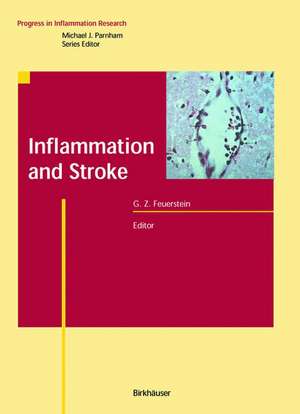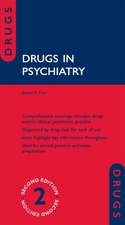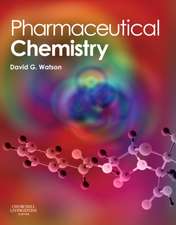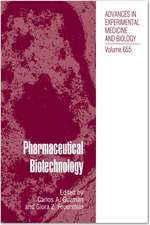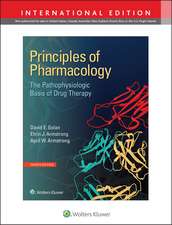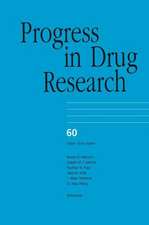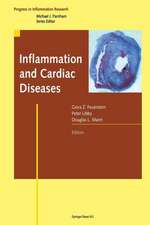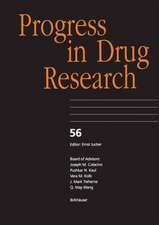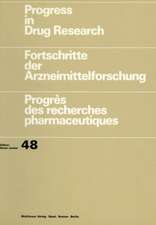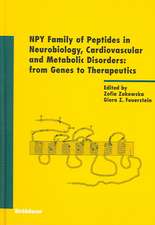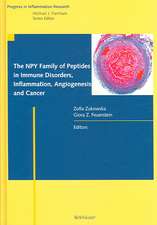Inflammation and Stroke: Progress in Inflammation Research
Editat de Giora Z. Feuersteinen Limba Engleză Hardback – 31 aug 2001
| Toate formatele și edițiile | Preț | Express |
|---|---|---|
| Paperback (1) | 373.12 lei 43-57 zile | |
| Birkhäuser Basel – 13 oct 2012 | 373.12 lei 43-57 zile | |
| Hardback (1) | 657.90 lei 43-57 zile | |
| Birkhauser Basel – 31 aug 2001 | 657.90 lei 43-57 zile |
Din seria Progress in Inflammation Research
- 5%
 Preț: 1615.04 lei
Preț: 1615.04 lei - 5%
 Preț: 1433.10 lei
Preț: 1433.10 lei - 5%
 Preț: 723.05 lei
Preț: 723.05 lei - 18%
 Preț: 950.21 lei
Preț: 950.21 lei - 15%
 Preț: 648.42 lei
Preț: 648.42 lei - 5%
 Preț: 1300.72 lei
Preț: 1300.72 lei - 5%
 Preț: 1103.95 lei
Preț: 1103.95 lei - 5%
 Preț: 1061.93 lei
Preț: 1061.93 lei - 5%
 Preț: 715.35 lei
Preț: 715.35 lei - 5%
 Preț: 1098.63 lei
Preț: 1098.63 lei - 5%
 Preț: 717.93 lei
Preț: 717.93 lei - 5%
 Preț: 996.71 lei
Preț: 996.71 lei - 5%
 Preț: 1413.72 lei
Preț: 1413.72 lei - 5%
 Preț: 1102.46 lei
Preț: 1102.46 lei - 5%
 Preț: 1102.82 lei
Preț: 1102.82 lei - 5%
 Preț: 991.70 lei
Preț: 991.70 lei - 5%
 Preț: 1115.86 lei
Preț: 1115.86 lei - 5%
 Preț: 720.31 lei
Preț: 720.31 lei - 5%
 Preț: 1611.76 lei
Preț: 1611.76 lei - 5%
 Preț: 654.23 lei
Preț: 654.23 lei - 5%
 Preț: 1414.64 lei
Preț: 1414.64 lei - 5%
 Preț: 652.77 lei
Preț: 652.77 lei - 5%
 Preț: 1099.94 lei
Preț: 1099.94 lei - 5%
 Preț: 1856.59 lei
Preț: 1856.59 lei - 15%
 Preț: 644.95 lei
Preț: 644.95 lei - 5%
 Preț: 1108.72 lei
Preț: 1108.72 lei - 5%
 Preț: 658.46 lei
Preț: 658.46 lei - 5%
 Preț: 1108.51 lei
Preț: 1108.51 lei - 24%
 Preț: 801.38 lei
Preț: 801.38 lei - 5%
 Preț: 715.19 lei
Preț: 715.19 lei - 5%
 Preț: 1807.08 lei
Preț: 1807.08 lei - 5%
 Preț: 721.40 lei
Preț: 721.40 lei - 5%
 Preț: 991.70 lei
Preț: 991.70 lei - 5%
 Preț: 720.68 lei
Preț: 720.68 lei - 5%
 Preț: 1100.09 lei
Preț: 1100.09 lei - 15%
 Preț: 577.87 lei
Preț: 577.87 lei - 5%
 Preț: 652.77 lei
Preț: 652.77 lei - 5%
 Preț: 653.35 lei
Preț: 653.35 lei - 5%
 Preț: 650.25 lei
Preț: 650.25 lei - 5%
 Preț: 1116.73 lei
Preț: 1116.73 lei - 5%
 Preț: 1096.98 lei
Preț: 1096.98 lei - 5%
 Preț: 1412.62 lei
Preț: 1412.62 lei - 5%
 Preț: 1420.49 lei
Preț: 1420.49 lei - 5%
 Preț: 721.77 lei
Preț: 721.77 lei - 5%
 Preț: 1102.10 lei
Preț: 1102.10 lei - 5%
 Preț: 1099.20 lei
Preț: 1099.20 lei
Preț: 657.90 lei
Preț vechi: 692.53 lei
-5% Nou
Puncte Express: 987
Preț estimativ în valută:
125.89€ • 131.79$ • 104.16£
125.89€ • 131.79$ • 104.16£
Carte tipărită la comandă
Livrare economică 07-21 aprilie
Preluare comenzi: 021 569.72.76
Specificații
ISBN-13: 9783764365110
ISBN-10: 3764365110
Pagini: 356
Greutate: 0.7 kg
Editura: Birkhauser Basel
Colecția Birkhauser
Seria Progress in Inflammation Research
Locul publicării:Basel, Switzerland
ISBN-10: 3764365110
Pagini: 356
Greutate: 0.7 kg
Editura: Birkhauser Basel
Colecția Birkhauser
Seria Progress in Inflammation Research
Locul publicării:Basel, Switzerland
Public țintă
ResearchCuprins
New opportunities for stroke prevention and therapeutics: a hope from anti-inflammatory drugs?.- Inflammation in stroke and CNS trauma — experimental and clinical evidence.- Clinical evidence of inflammation as a risk factor in ischemic stroke.- Inflammation as a risk factor for stroke: evidence from experimental models.- Inflammatory and immune responses to CNS injury: beneficial and detrimental components.- Salutary effect of autoimmune T cells after central nervous system injury.- Traumatic brain injury: is head trauma an inflammatory disease?.- Cyclic activation and inactivation of brain vessels involving inflammatory mediators — implications for stroke.- Inflammatory cells in stroke.- Do leukocytes play a role in focal ischemia in the brain? An objective review of the literature.- The role of microglia in ischemic brain injury.- Inflammatory activation of brain cells by hypoxia: transcription factors and signaling pathways.- Inflammatory cytokines, interleukins and chemokines in stroke and CNS trauma.- Cytokine effects on CNS cells: implications for the pathogenesis and prevention of stroke.- Interleukin-10 in cerebral ischemia and stroke.- Chemokines and ischemic stroke.- Biphasic activity of tumor necrosis factor in stroke and brain trauma: interaction with reactive oxygen species.- Interleukin-1 and IL-1 receptor antagonist in stroke: mechanisms and potential therapeutics.- Inflammatory cytokines in CNS trauma.- Inflammation in cerebral thrombosis, angiogenesis and matrix regulation: a new perspective in stroke research and therapeutics.- Microvessel integrin expression during focal cerebral ischemia.- The inflammatory response in focal cerebral ischemia.- Chronic neuronal perturbation mediated by RAGE, a receptor for ?-sheet fibrils and S100/calgranulins.-Mediators of inflammation and blood-brain barrier permeability in cerebral ischemia.- Inflammatory proteases and oxygen radicals in stroke.- The role of metalloproteinases on blood-brain barrier breakdown after ischemic stroke.- Matrix metalloproteinases and their inhibitors in hypoxia/reoxygenation and stroke.- Extracellular matrix-degrading metalloproteinases and neuroinflammation in stroke.- Anti-oxidant strategies to treat stroke.- Inflammatory adhesion molecules, kinins, nitric oxide complement factors and lipid mediators in stroke.- Selectin-and complement-mediated mechanisms of tissue injury in stroke.- The kallikrein-kinin system in ischemic and traumatic brain injury.- Nitric oxide, nitric oxide synthases and cyclooxygenase-2 in experimental focal stroke.
